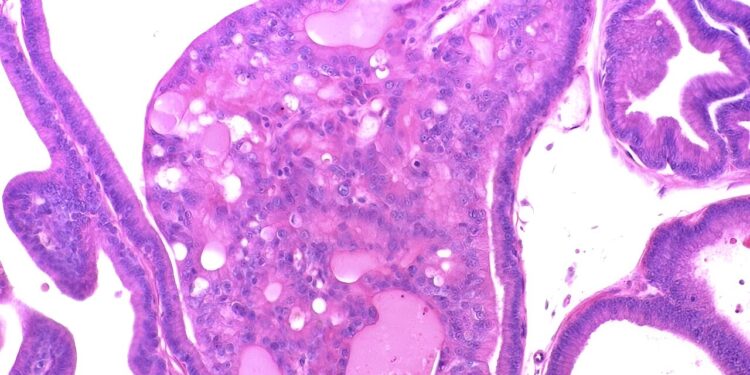Prostate cancer cells in rats subjected to maternal protein restriction. Credit: FAPESP
Experiments on rats carried out by researchers at the State University of São Paulo (UNESP) in Brazil provide insight into why offspring of women who suffered from malnutrition during pregnancy tend to face a higher risk of prostate cancer in adulthood.
In a first study published in Scientific reportsThe researchers detected alterations in gene expression that may have been associated with the hormonal imbalance observed in the rats’ offspring and the increased risk of prostate cancer.
“The lack of protein during gestation and lactation dysregulates the molecular pathways involved in the normal development of the prostate, leading to impaired growth in young children. This was already known. We have now discovered that a poor diet in proteins during the embryonic stage and the first two years after birth modify the expression of more than 700 genes in the offspring, including the ABCG1 gene, associated with prostate cancer,” said Luis Antônio Justulin Junior, who directs research and is a professor at the Botucatu Institute of Biosciences (IBB-UNESP).
In a second study published in Molecular and Cellular Endocrinologydysregulation of a specific type of RNA (microRNA-206) correlated with an early increase in the hormone estrogen, a pronounced trait in the offspring of female rats fed a low-protein diet during gestation and lactation, and a factor associated with an increased risk of prostate cancer.
“The results showed once again how diet and everything that happens during the early stages of development determine the trajectory of health and disease in offspring. They were a key contribution to our understanding the first 1,000 days of life, the period including pregnancy, breastfeeding and infancy until the baby’s second birthday,” Justulin said.
A lifelong influence
Research on the links between maternal health and offspring development has advanced significantly in recent decades, particularly in an area known as developmental origins of health and disease (DOHaD). There is considerable evidence that inadequate gene-environment interaction during the embryonic stage and during the first two years after birth may be a key factor in increasing the lifetime risk of chronic non-communicable diseases (NCDs), such as cancer, diabetes and chronic respiratory disorders. and cardiovascular diseases.
According to an international study published in 2009, the risk of prostate cancer was much higher than normal among Jewish men exposed from early childhood to famine and the horrors of the Holocaust. The study of how behavioral and environmental factors such as maternal malnutrition affect gene expression is called epigenetics. Epigenetic changes are reversible and do not alter DNA sequences by causing mutations. They can change the way the body reads a DNA sequence and alter gene expression in offspring. New patterns of gene expression can be passed on to future generations.
Research carried out at UNESP investigated the cellular mechanisms involved in this process through experiments on rats. Some of the results are presented in the article published in Scientific reports. The authors describe the global expression profile of microRNAs and messenger RNAs, highlighting molecular alterations associated with increased prostate cancer risk. It should be remembered that microRNAs modulate the expression of messenger RNA via epigenetic mechanisms and that messenger RNA plays a crucial role in protein synthesis. Thus, microRNAs are important factors in gene expression.
After producing RNA sequences and analyzing them using bioinformatics, the researchers concluded that prostate cancer in children with maternal malnutrition and in older rats exposed to intrauterine protein restriction could be due to early dysregulation of miR-206 and its target gene PLG, and that this dysregulation was likely a response to abnormally high estrogen levels during pregnancy.
“We also found that miR-206 modulates the expression of estrogen receptor alpha (ERα), which is thought to be associated with increased risk of prostate cancer in adulthood,” Justulin said.
Hormonal imbalance has been observed early in life, in addition to differences in glandular development and growth, he explained. “These animals had higher estrogen levels, which increased even more with age, while androgen levels decreased. This hormonal imbalance is associated with the development of prostate cancer in men,” a- he declared.
The article published in Scientific reports received an award at the first DOHaD conference organized in Brazil by Associação DOHaD Brasil.
Target gene
In the article published in Molecular and Cellular Endocrinologythe group described alterations in more than 700 genes in the prostate of rat offspring, identified by RNA sequencing (RNA-seq), which measures the expression of multiple genes to obtain the transcriptome, the complete set of molecules of RNA present in the cells of a tissue sample.
When the researchers looked for correlations between the study results and a human prostate cancer database, they found that ABCG1, one of the altered genes, was a potential “DOHaD gene” associated with disruptions in prostate development, which have long-lasting effects that could increase the risk of cancer.
“We showed that changes in the gene expression profile can persist throughout the life of rats, predisposing them to prostate cancer as they age. Intriguingly, we identified molecular markers that are frequently dysregulated in young and aged rats with maternal malnutrition, as well as in humans. “The data indicate that maternal malnutrition is a key environmental factor in the origin of prostate cancer in rats,” Justulin said.
More information:
Luiz MF Portela et al, Early origin of prostate cancer by deregulation of miR-206 networks in rats resulting from maternal malnutrition, Scientific reports (2023). DOI: 10.1038/s41598-023-46068-1
Ana CL. Camargo et al, Dysregulation of ABCG1 early in life contributes to prostate carcinogenesis in maternally malnourished rats, Molecular and Cellular Endocrinology (2023). DOI: 10.1016/j.mce.2023.112102
Quote: Research explains why a low-protein diet during pregnancy increases the risk of prostate cancer in offspring (January 24, 2024) retrieved January 25, 2024 from
This document is subject to copyright. Apart from fair use for private study or research purposes, no part may be reproduced without written permission. The content is provided for information only.



